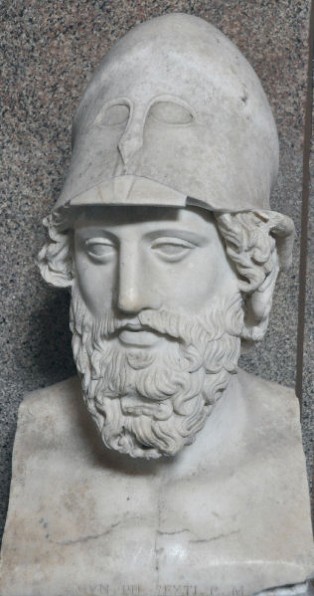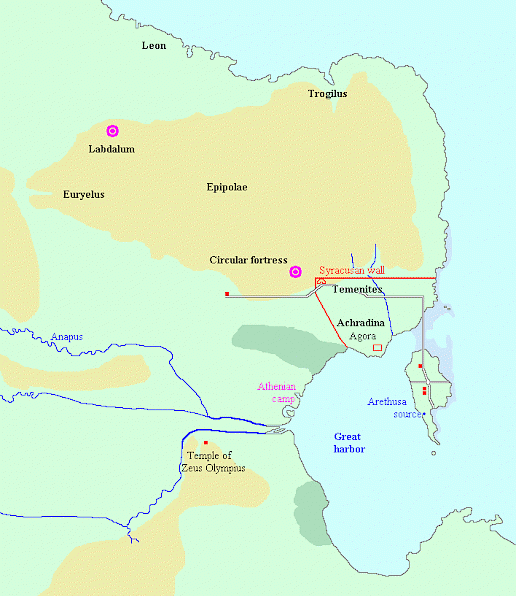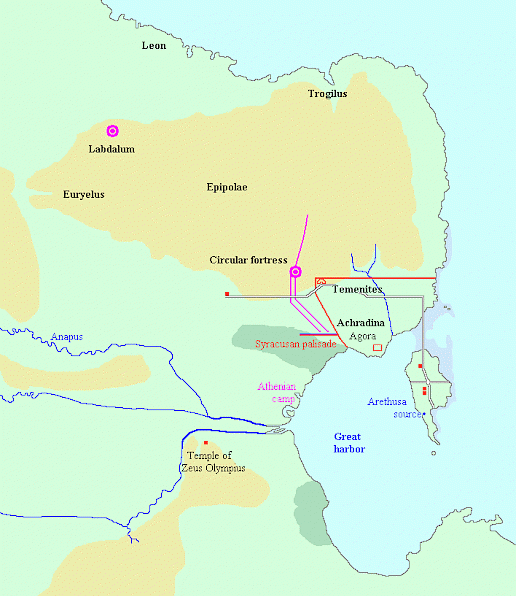Lamachus
Lamachus (†414 BCE): important Athenian commander during the Archidamian War and the Sicilian Expedition.

The first recorded command by Lamachus is mentioned in Plutarch's Life of Pericles: in c.435, the Athenian commanded an expeditionary force of thirteen ships that was to assist the inhabitants of Sinope, a town on the southern shore of the Black Sea, against the tyrant Timesileus. After he had achieved success, an Athenian colony was organized near Sinope. This expedition had been organized by Pericles, and it is likely that the two men worked together more often, which would suggest that Lamachus was a moderate democrat.
During the first phase of the Peloponnesian War between Athens and Sparta, the Archidamian War, Lamachus is not mentioned. A likely explanation is that he was occupied with business that Thucydides, our main source, found unimportant: for example, collecting tribute. However this may be, Lamachus was sufficiently well-known to be the object of series of jokes in the final part of the Acharnians, a comedy by Aristophanes that was staged in 425.
In the spring of 424, Lamachus was sent to the Black Sea again, but this operation was not successful: he lost ten ships when the waters of a river suddenly started to rise. However, Lamachus was able to bring back his men to Calchedon, where they were safe. The incident did not break off his career. When in March 421 the Peace of Nicias was signed, Lamachus was one of those who swore the oaths. The Archidamian War was over. It had ended with the two sides exhausted, but Athens was the undisputed winner.
In 416/415, Lamachus was elected as commander of the great expedition that the Athenians were organizing against Sicily. It is possible that they considered him a reliable man who could act as intermediary between the other commanders, Nicias and the Alcibiades, who were not on very good terms. From its very beginning, the expedition was doomed.
When the armada arrived on Sicily, many allies started to have doubts: why did the Athenians send so many ships? Lamachus now proposed to attack Syracuse immediately. According to Thucydides, taking the main city on the island when it was still unprepared, was the best policy. Nicias proposed to support the allies and return home before the display of strength had diplomatically backfired. Alcibiades suggested to find more allies, create a supply base, and attack Syracuse only after this build-up. In the end, Lamachus sided with Alcibiades. Catana, north of Syracuse, became the Athenian supply base.

The element of surprise was now lost. Even worse, Alcibiades was recalled, leaving two commanders in charge who did not like the strategy they had embarked upon. In the spring of 414, they laid siege to a Syracuse that had been prepared by its democratic leader Hermocrates. The most important improvement was that the northern part of the city had been surrounded by a new wall that made it impossible to storm Syracuse from the north. Because west of Syracuse was a marshy plain, the Athenians could only attack from the northwest. And so they did. Before the Syracusans were able to occupy the plateau known as Epipolae, the Athenians landed at Leon, gained access to the plateau at Euryelus, seized the plateau, and built a large fortress, called "the circle".

The Athenians knew that they had to hem in the Syracusans, so that they could starve them. They started to build a wall across Epipolae. One wall was to lead to Trogilus the north, and another to the south, to the Great Harbor. The Syracusans responded by digging a trench and building a palisade through the marshy area to the west, so that they would retain command of a road to the inland of Sicily. An elite regiment of Athenian soldiers, commanded by Lamachus, destroyed the palisade. However, Lamachus was killed in action. Nicias, who was by now suffering from a serious illness, was left in charge of the Athenian expeditionary force. He was unable to bring the siege to a successful end. Only few Athenians were able to return home.